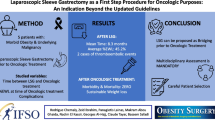Abstract
Introduction
The immunosuppressive therapy for life after liver transplantation (LT) is considered as a risk factor for obesity. Seven percent of the transplanted patients develop severe or morbid obesity. The obesity induces non-alcoholic steatohepatitis (NASH), which is a major risk factor for liver cirrhosis and hepatocellular carcinoma, without forgetting the cardiovascular risk and the devastating impact of obesity on quality of life of the transplanted patients. Consequently, obesity exposes these patients to future transplant loss. Bariatric surgery has been proposed for transplant patients to reduce the obesity-related comorbidities and to improve survival. We report in this video the surgical technique of laparoscopic sleeve gastrectomy (LSG) after LT.
Methods
We have performed between 2008 and 2017 the sleeve gastrectomy (SG) after LT in nine patients. Six procedures (66%) were performed totally by laparoscopy and three by upfront laparotomy. All the patients had a standard preoperative evaluation for obesity. All the procedures were assisted by a hepatic surgeon. Postoperatively patients were transferred to the liver ICU for 24 h then to the liver unit ward.
Result
The median BMI was 41.9 kg/m2 (range 38–46.1 kg/m2). Median operative time was 120 min (range, 90–240 min). No intra-operative complications occurred. The median length of hospital stay was 7 days (range, 4–81 days). The postoperative course of the majority of the patients was uneventful except for one patient who develops a staple line leak.
Conclusion
LSG after LT is technically feasible. Larger series are needed to improve the safety of the procedure in this high-risk population.
Similar content being viewed by others
References
Annual Report of the US Organ Procurement and Transplantation Network and the Scientific Registry of Transplant Recipients: Transplant Data 1994–2009. Department of Health and Human Services, Health Resources and Services Administration, Healthca. Available from: https://srtr.transplant.hrsa.gov/annualreports/2012/pdf/2012_SRTR_ADR.pdf
Blackburn GL, Mun EC. Effects of weight loss surgeries on liver disease. Semin Liver Dis. 2004;24(4):371–9.
Hafeez S, Ahmed MH. Bariatric surgery as potential treatment for nonalcoholic fatty liver disease: a future treatment by choice or by chance. J Obes. 2013;2013:839275.
D’Amico G, Tulla K, Tzvetanov I. Bariatric Surgery and Transplantation. Glob Bariatric Surg. 2018;471–478
Lazzati A, Iannelli A, Schneck A-S, et al. Bariatric surgery and liver transplantation: a systematic review a new frontier for bariatric surgery. Obes Surg. 2015;25(1):134–42.
Elli EF, Gonzalez-Heredia R, Sanchez-Johnsen L, et al. Sleeve gastrectomy surgery in obese patients post-organ transplantation. Surg Obes Relat Dis. 2015;
Butte JM, Devaud N, Jarufe NP, et al. Sleeve gastrectomy as treatment for severe obesity after orthotopic liver transplantation. Obes Surg. 2007;17(11):1517–9.
Heimbach JK, Watt KDS, Poterucha JJ, et al. Combined liver transplantation and gastric sleeve resection for patients with medically complicated obesity and end-stage liver disease. Am J Transplant. 2013;13(2):363–8.
LavilleM RM, Chavrier G, et al. Recommendations regarding obesity surgery. Obes Surg. 2005;15(10):1476–80.
Lin MYC, Tavakol MM, Sarin A, et al. Safety and feasibility of sleeve gastrectomy in morbidly obese patients following liver transplantation. Surg Endosc. 2013;27(1):81–5.
Khoraki J, Katz MG, Funk LM, et al. Feasibility and outcomes of laparoscopic sleeve gastrectomy after solid organ transplantation. Surg Obes Relat Dis. 2015;12(1):75–83.
Author information
Authors and Affiliations
Corresponding author
Ethics declarations
Ethical Approval
The procedure was performed in accordance with the ethical standards of the institutional and the national research committee.
Conflict of Interest
The authors declare that they have no conflicts of interest.
Informed Consent
Informed consent was obtained from the individual participant included in the study.
Additional information
Publisher’s Note
Springer Nature remains neutral with regard to jurisdictional claims in published maps and institutional affiliations.
Electronic supplementary material
Rights and permissions
About this article
Cite this article
Bou Nassif, G., Salloum, C., Paolino, L. et al. Laparoscopic Sleeve Gastrectomy After Orthotopic Liver Transplantation, Video Reported. OBES SURG 29, 1436–1438 (2019). https://doi.org/10.1007/s11695-019-03751-5
Published:
Issue Date:
DOI: https://doi.org/10.1007/s11695-019-03751-5




